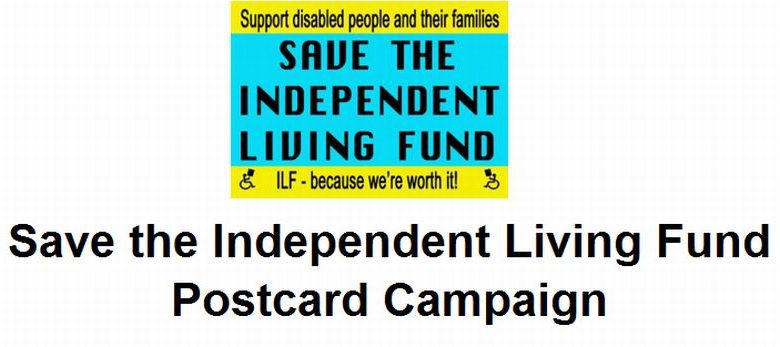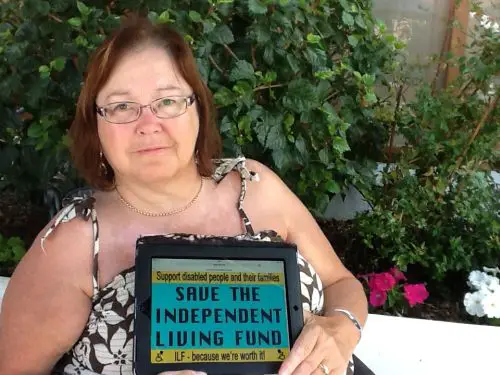
Closure of the Independent Living Fund: there are questions to be answered
Why is the closure of the Independent Living Fund important (ILF)? What does it have to do with you, or me? And just what does independent living really mean? Lorraine Gradwell explores…
Let’s start with the easy question first: independent living means autonomy. It means being in charge of your own life, living how and where you want, with who you want, and doing what you want to do when you want to do it.
Of course, we live in communities and families and that means we take other people into account, so independent living isn’t a recipe for anarchy or dictatorship! But it is about being contributing members of society on our own terms.
The thing is, some of us can’t do this without support. That support can take a variety of forms: washing our hair, helping us cook, accompanying us to concerts, helping us remember to pay the bills, getting us out of bed… the list goes on.
The point is that many people use a variety of things to help them live their lives, it’s not just disabled people, it’s just that some are more socially recognised than others. We all rely on such supports, from having shoes and clothes made by others, to relying on bus drivers and taxi drivers. Independence is largely, therefore, a question of degree.
However, some of these supports are provided by society as a matter of course, and some are not. Some you can access only if you are relatively well-off. But if you can’t afford the support you need, you may not have a choice about what you get. And it is choice that is threatened by the closure of the ILF.
I’m not going to go into the history of the ILF in any detail (you can read about in the A Future without ILF paper and on the Jenny Morris blog), but the fund was set up in 1988 by the conservative government as a part of planned welfare changes. The aim was for the government to set up a fund to help people who are severely disabled, who are on low incomes, in receipt of attendance allowance, and who have to pay for their ‘domestic care’.”
And so the ILF was created – against expectations it was very popular, and unfortunately has been subject to various attempts to limit it ever since. Currently the ILF is set to close in June 2015.
So why is all this important? There are very many reasons, such as the claimed illegality of the lack of consultation around the closure. It’s been said that it contravenes the UN Convention on the Rights of People with Disabilities and government’s own Independent Living Strategy. It’s also concerning that funding transferred to local authorities will not be ring fenced and that the government has admitted that some disabled people may receive a lesser level of support.
But for me the big issue is choice. When I was a child/teenager in the 60s, when disability rights was a low murmur in scarce places, it was very common for disabled people to live in residential homes, on hospital wards, or in old people’s homes. It’s hard to convey these days just how far apart disabled people were from the rest of society.
I remember in the weeks leading up to my A level results an auntie said to my mum; “well, can she work at the telephone exchange? Lots of cripples go there.” And indeed they did. But to me, well, I thought; “does she not know me at all?”
The truth was that she had absorbed the notion that disabled people were ‘other’, that we weren’t the same as everyone else, despite having known me all my life. Achingly slowly, disabled people have pushed back at these perceptions, have negotiated, planned, redesigned and fought their way to a better understanding of how we can be contributing citizens in our society, of how we can be independent.
This is now under serious threat. With draconian purpose, the world of support to enable disabled people to have a meaningful life on their own terms is being destroyed. Changes to out of work benefits, in work support, DLA, housing benefit and the spare room subsidy (bedroom tax), among others, threaten our independence.
There is no defensible rationale for these political decisions – they cause only harm and distress and only save negligible amounts of money. People’s autonomy is threatened; their contribution to family life, to society and their ability to work. In addition, there are risks to the local economy. How many PA/support workers will lose their jobs with the closure of the ILF?
And so to my third question – why is it important to me, and you? Chances are that you, like me, are not a recipient of ILF and you might say ‘so what?’. But here’s the thing – do we want a return to those attitudes and perceptions that prevailed in my childhood? Does the current increase in reports of disability hate crime herald a return to general negative attitudes to us?
Lots of disabled people report that they feel less safe than they used to – isn’t this alarming? I’m tempted to call it the thin end of the wedge but actually, it’s not so thin. To take away the support system of a group of citizens who depend on that support to live an meaningful life on their own terms is an ideology I find scary.
Although I’d condemn practically all the recent changes to disability benefits, I believe the closure of the ILF is the lowest of them all, and I would hope you’d agree. In which case there are several things you can do, starting with a visit to the ILF postcard campaign website, where you can join the campaign, send a postcard to your MP, or just register your support. Because it’s important.
Let disability not be a low murmur in scarce places.
Check out…
• Speak Out 4 Care: get your voice heard
• Challenging impaired perceptions of disability
• Disability Rights UK: where we’re at and what we need to do
Want your voice to be heard? Get in touch by messaging us on Facebook, tweeting us @DHorizons, emailing us at editor@disabilityhorizons.com or leaving your comments below.
